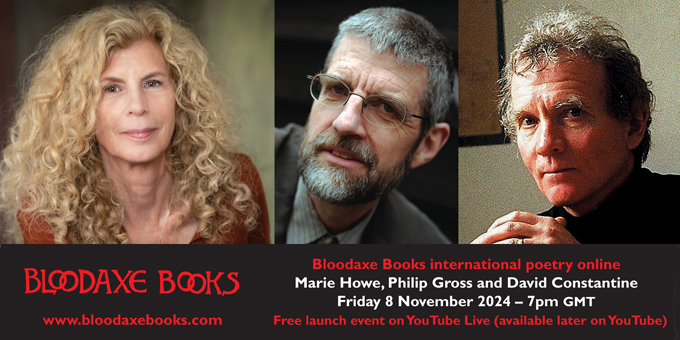
Launch reading by Marie Howe, Philip Gross and David Constantine
This launch reading by Marie Howe, Philip Gross and David Constantine, celebrating the publication of our new November titles, is now available to watch on our YouTube channel. All three poets read live and discussed their work with each other and with the host, Bloodaxe editor Neil Astley.
This free Bloodaxe launch event was streamed on YouTube Live and is now available below or here: https://youtube.com/live/lEW5RAH5R-g.
To order copies of the poets’ books direct from Bloodaxe, please click on these links. If you are in Ireland or elsewhere in the EU, you can pre-order via Books Upstairs in Dublin.
David Constantine: A Bird Called Elaeus
https://www.bloodaxebooks.com/ecs/product/a-bird-called-elaeus-1358
Philip Gross: The Shores of Vaikus
https://www.bloodaxebooks.com/ecs/product/the-shores-of-vaikus-1359
Marie Howe: What the Earth Seemed to Say
https://www.bloodaxebooks.com/ecs/product/what-the-earth-seemed-to-say-1360
*
David Constantine: A Bird Called Elaeus
The Greek Anthology, marvellous salvage from the vast shipwreck of the Ancient World, is a collection of around 4500 poems composed over more than 1500 years by about 300 authors, a colossal continuity and variety from pre-classical times through Roman into Byzantine.
For A Bird Called Elaeus – his small anthology of the vast original – David Constantine has gone particularly not just to the renowned love poems but also to poems that treat man’s dealings with the earth, his work and trades there, the creatures other than himself who inhabit it and the divinities whose care it is.
He has quite often taken the liberty of bringing already urgent poems closer to home and our drift towards the Sixth Extinction. Several times he expanded a Greek text; once or twice combined two poems into one; or wrote a poem of his own which he could not have written had he not read and translated the ancient words first. But most often he kept close, doing his level best to bring into his English what was so livingly there in the Greek.
The Ancient World was not populated by humans harmless to Mother Earth, not at all: often they, like us, did the worst their means enabled them to do. Still there were laws. These things you must not do. Doing them nevertheless was understood as transgression of laws beyond the human laws. You offended Demeter at your peril. Understand that how we like, it’s the same now. And the peril is infinitely greater, threatens to be final, consuming the innocent with the guilty.
*
Philip Gross: The Shores of Vaikus
In the course of forty years an increasingly subtle conversation has evolved between words and silence at the core of Philip Gross's poetry. This is never more so than in the poems of this edgy homage to Estonia, the country of his refugee father’s birth.
At this collection’s heart, the shapeshifting prose-poem monologues of Evi And The Devil weave a haunted landscape out of folktale, dark humour, the routine atrocities of history and a vividly present sense of place. The island of Vaikus (one of several words for silence in Estonian) is Estonia condensed, refracted in the dark waters of a bog pool. The voice that speaks with such compelling otherness is a channelling of a culture and a disposition often drowned out in successive occupations by the empires of the day, but always alive, and whispering. The resulting book is both a bold departure and a drawing together of the whole range of a writing life.
The Shores of Vaikus is Philip Gross’s 28th book of poetry, and his 13th from Bloodaxe, following The Thirteenth Angel (2022), which was shortlisted for the T.S. Eliot Prize.
*
Marie Howe: What the Earth Seemed to Say: New & Selected Poems
What the Earth Seemed to Say is a powerful collection of more than three decades of profound, luminous poetry from one of America’s most daring and courageous poets.
With its ‘radical simplicity and seriousness of purpose, along with a fearless interest in autobiography and its tragedies and redemptions’ (Matthew Zapruder, New York Times Magazine), Marie Howe’s poetry transforms penetrating observations of everyday life into sacred, humane miracles. This essential volume draws from each of her four previous collections – including Magdalene (2017), a spiritual and sensual exploration of contemporary womanhood, and What the Living Do (1997), a haunting archive of personal loss – and contains twenty new poems. Whether speaking in the voice of the goddess Persephone or thinking about ageing while walking the dog, Howe is ‘a light-bearer, an extraordinary poet of our human sorrow and ordinary joy’ (Dorianne Laux).
'This rich and luminous compilation draws from four previous collections, including the hauntingly elegiac What the Living Do (1997), a tribute to Howe’s brother, who died as a result of Aids, and Magdalene (2017), an intense exploration of womanhood. It opens with a bounteous selection of new work. [...] Howe’s poems carry an emotional depth and transcendent simplicity. There is a simultaneous earthliness and spirituality in her musings on the metaphysical revelations of the divine, the sacred and the eternal.' – Jennifer Lee Tsai, The Guardian
Read Jennifer Lee Tsai's full review of What the Earth Seemed to Say in The Guardian here.
[01 November 2024]



